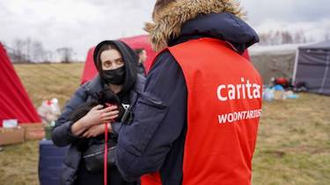Caritas Appeal launched to support Ukraine

Caritas Internationalis - a confederation of 162 members, including CAFOD and SCIAF, has launched an appeal for Ukraine. It followed a zoom conference of around 220 representatives of Catholic organisations on 1 March highlighting the escalating humanitarian crisis in the country following invasion by Russian forces a week ago.
The organisations included Vatican agencies, Caritas offices in countries throughout Europe and further afield, along with Caritas Europa and Catholic agencies in Britain and Ireland. Sombre faces covered nine pages of zoom contacts. The initiative goes alongside Pope Francis declaring Ash Wednesday a Day of Prayer and Fasting for Peace in Ukraine "in order to be near to the suffering Ukrainian people, to be aware that we are all brothers and sisters, and to implore God for an end to the war".
Aloysius John, the General Secretary of Caritas Internationalis said: "in less than a week, Ukrainian people's lives turned into a nightmare." He called for, "a safe humanitarian corridor for aid and a peaceful solution to conflict." Refugees at Ukraine's borders trying to leave now number more than half a million in only six days and numbers are rising.
First-hand accounts from Ukraine were given by Tetiana Stawnychy of Caritas Ukraine and Fr Vyacheslav Grynevych of SPES Ukraine. Tetiana gave an overview, reporting the humanitarian situation as worsening by the day with thousands in transit to border plus others left behind amidst fighting. Caritas is running 25 welcome centres in Ukraine where people on the move can access warm food and drink, hygiene kits, a place to sleep and be helped on their way. At the border it provides tents and heaters, hot food and drink, and psycho-social support. Parishes near the borders are helping. "There are a lot of frightened women and children," reported Tetiana. She described the situation as "critical and very volatile."
From Ukraine's capital Kyiv, Fr Vyacheslav reported the need for fuel, mattresses, blankets, medical supplies, food and a better communication network for coordination. "I see a lot of parents struggling - running up and down to basements" he reported, but "the solidarity is inspiring both locally and from Caritas in neighbouring countries." He said grocery shops in Kyiv were empty and Ukrainian soldiers and civil defence volunteers were patrolling the streets. There were 37 people sheltering in his house - some mothers and children and neighbours - and 200 others in local shelters being helped by SPES and volunteers. Support includes heroic, "reaching out to people in line of fire." He reflected that, "war makes both adults and children cry and recovery will take a long time" and "this terrible war is like a terrible dream".
Caritas staff and volunteers are also providing safe transport for displaced families to reach their loved ones. Ireneusz Kyause of Caritas Poland reported a mobilisation of aid in surrounding countries. Around 3,000 children evacuated from Ukraine are being helped and the Polish government is ready to take 7,000 orphans. Tens of thousands are pouring across the Polish border and all refugees need food, non-food items and medical assistance. Caritas Romania and Moldova are offering similar support. Caritas Malta checked out whether Caritas agencies on the front line wanted money collections or material goods or both. There was a strong commitment to work together to support vulnerable families across borders.
The contacts in Ukraine were asked: "How do you have hope in this situation?"
Tetiana responded that "people are finding hope by helping one another". "Understanding we are together" responded Fr Vyacheslav, "and humour supports us." He praised those such as staff of a local pharmacy who are bravely delivering medicines despite the danger. Also, the commitment of 67 staff members and 120 volunteers of Caritas-SPES. He said, "with God's help, we will continue our service, leaving no one behind."
In the chat it was raised that 'third country nationals' (for example from African countries) are struggling to be allowed to cross certain borders, such as Romania. There was a call for Caritas to lobby responsible authorities to offer safe passage to all vulnerable people without discrimination?
LINKS
Caritas Internationalis Ukraine Appeal: www.caritas.org
CAFOD Ukraine Appeal: https://cafod.org.uk/News/International-news/Ukraine-crisis
SCIAF Ukraine Appeal: https://sciaf.org.uk/get-involved/appeals/741-ukraine-appeal


















